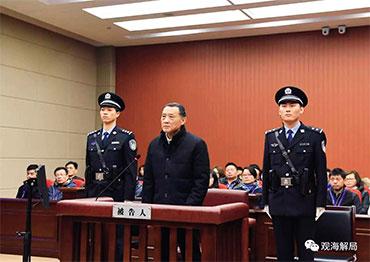Mao Zhaohui told our reporter that some outgoing officials would appoint trusted followers to senior posts to continue their malign influence after they retired. Yet when these staff were investigated, they were quick to divulge on the malpractices of their predecessors. Many officials linked to corruption took up post-retirement positions at enterprises where they could continue their illegal business activities through personal connections.
On July 27, 2018, Hu Houquan, former deputy director at Foshan City Planning Bureau in Guangdong Province, was sentenced to four years in prison. Retired for six years, Foshan disciplinary watchdogs said that Hu illegally paved the way for enterprises in terms of administrative approval but accepted bribes only after retirement to evade justice.
On April 7, Guo Deqing, former chairman of the Political Consultative Conference of Baiyin, Northwest China’s Gansu Province, was disgraced after seven years of retirement, during which he served as a supervisor of a local company. According to a report by China Discipline Inspection and Supervision News, he accepted twice as many bribes after he retired than when he was in the office.
In October 2014, Zhao Shaolin, former secretary-general of the Party Committee of Jiangsu Province, was put under investigation eight years after his retirement. In May 2017, he was sentenced to four years in prison and fined 15 million yuan (US$2.3m). The written judgment showed that from 2007 to 2014, Zhao Shaolin served as chief adviser at a real estate company owned by his son Zhao Jin, whom he helped to fabricate foreign trade contracts to fraudulently purchase foreign currency worth over US$41.7 million.
Zhao Shaolin was the first corrupt high-ranking official caught by the central disciplinary inspection team after they arrived in Jiangsu Province. Five senior officials were found to be involved in the same case, and they were sentenced to prison, including He Jiacheng, former executive deputy director of the National Academy of Governance, Zhou Benshun, former Party chief of Hebei Province, Wang Min, former Party chief of the city of Jinan, Shandong Province, Yang Weize, former Party chief of the city of Nanjing, Jiangsu Province, and Wu Changshun, former public security chief of Tianjin.
In recent years, a growing number of retired officials have surrendered themselves. On July 31, 2018, Ai Wenli, former vice-chairman of Hebei Provincial Political Consultative Conference, gave himself up, the first official above ministerial level to surrender himself since China’s Supervision Law was enacted in March 2018.
In February 2019, Chen Jianshe, former vice-chairman of the Political Consultative Conference of Shaoxing, East China’s Zhejiang Province, turned himself in. He said in his confession letter that “15 years after retirement, I finally gave myself solace and sounded an alarm to officials nearing retirement.”
According to Zhuang Deshui, deputy director of Peking University Clean Government Center, recent investigations into retired officials point to a new direction in the country’s corruption crackdown. In the past, retirement usually meant a soft landing but nowadays, he added, there is a one-size-fits-all anti-graft policy.
In the 1980s, China unveiled polices to prohibit retired officials from doing business and opening enterprises. “It’s about time to strengthen supervision of retired officials and improve regulations to prevent them from profiteering from their political influences,” Zhuang told NewsChina.
Wang Minggao, a clean government professor at Hunan University of Technology and Business, told our reporter that China’s anti-graft campaign is still underway and it is yet to win a decisive victory.
“The goal of creating a deterrent against corruption has not been attained, as can be seen from these cases,” he said. “We are still building up a moral defense against corruption.”

 Old Version
Old Version
